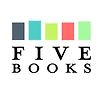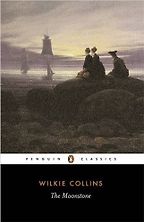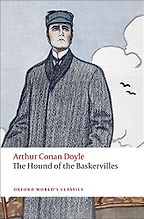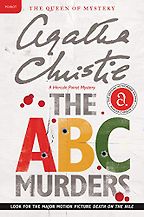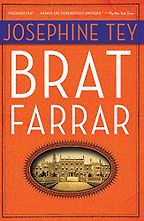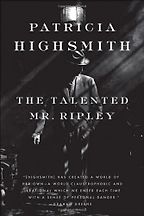I am an avid reader of crime fiction and read a lot of it, whether it’s the latest book by Robert Galbraith or Jane Harper or a newly translated Georges Simenon. I particularly enjoy reading books written in the past, whether a few decades or even one or two centuries ago. I love getting a sense of the texture of daily life historically and of people’s thinking. I’m happy to read almost anything, but this is escapism for me—an alternative to watching TV—so I don’t need anything too gritty and bleak, or too heavily written and literary.
My criteria for choosing the books on this list are simple. Firstly, it had to be written before 1960. Secondly, it had to be by an author that I liked so much that after reading one book by them I proceeded to read every single book they’d written I could get my hands on. Apologies if some (all) of the books on this list are predictable and you’ve already read them. I could have added more unusual books, but then I wouldn’t have been sticking to my ground rules.
The Moonstone (1868) by Wilkie Collins
I first came across Wilkie Collins thanks to Five Books co-founder, Al Breach. We had just finished high school and were teaching in a rural school in Zimbabwe. By candlelight (there was no electricity or running water where we were), Al peered into The Woman in White every night and raved about what a fantastic book it was. Collins was a contemporary and friend of Charles Dickens, who I’d been forced to read at school, and so it was only five years later that I finally succumbed and opened my first book by Wilkie Collins, The Moonstone. The book starts in India, but is mostly set in England, and revolves around the family and country house that the Indian diamond, ‘the Moonstone’ is stolen from. First published in 1868, The Moonstone is—and will always be—a Victorian novel, but the writing is very accessible. The different narrators talk directly to the reader, as if to a friend or confidant. Some are very funny, like the house steward, Gabriel Betteredge, who uses Robinson Crusoe as a kind of Bible to guide him in life. Most important of all for me, the plot is excellent.
Great claims have been made for The Moonstone in the history of detective fiction. TS Eliot, for example, said it was “the first, the longest and the best of modern English detective novels.” I have read other early detective stories, from Edgar Allan Poe’s “The Murders in the Rue Morgue” to The Celebrated Cases of Judge Dee, written anonymously in 18th century China and translated during World War II by a Dutch diplomat, Robert van Gulik. These are a lot of fun and very interesting, but they don’t speak to me the way The Moonstone does. For me, Collins’s novel is the first one where I felt completely engaged in the story and needed to know what happened next.
Our interview about Wilkie Collins is with Professor Jason Hall of the University of Exeter
The Hound of the Baskervilles (1902) by Arthur Conan Doyle
The Hound of the Baskervilles is a short book, easily read in an afternoon. I first heard of it when I was about seven and a picture and short summary featured in a diary I was given. It was already enough to send shivers down my spine. The book opens in London, in Baker Street, with the usual back-and-forth between Sherlock Holmes and Dr. Watson as they deduce what kind of man has left behind his walking stick. The plot quickly draws you in with its combination of a family curse, the unforgettable setting of the bleak, Devon moors and the hellish, spectral hound that haunts them. Sir Charles Baskerville feared his own death and duly died—will the last of the Baskervilles, Sir Henry, fresh back from the colonies, also fall victim if he returns to Baskerville Hall? It’s very, very cleverly done.
Our interview about Sherlock Holmes (or Arthur Conan Doyle) is with Washington Post literary critic Michael Dirda
The ABC Murders (1936) by Agatha Christie
I can’t remember which was the first Agatha Christie I came across, but I’ve tried to read all of her crime novels. It’s primarily about the plots. Only rarely does the twist in a contemporary mystery book give me the satisfaction that Agatha Christie does. I suppose it’s also the familiarity: with each book I know I’m going to get the same thing and yet cleverly different. The ABC Murders features her Belgian detective, Hercule Poirot, before she got really fed up of him. The story is mainly told through the eyes of his old friend, Captain Hastings, who comes back from South America to find Poirot dying his hair. Poirot has received an anonymous letter signed A.B.C., challenging him about a mystery which he won’t be able to solve. The plot revolves around the ABC Rail Guide—the train timetable book that was widely used at that time—and is one of her cleverest.
When I spoke to Agatha Christie’s grandson, Mathew Prichard, he speculated at how she came up with it: “There was always a copy of the ABC railway guide beside my grandmother’s telephone. I’m sure that’s where the story originated. I can see her sitting there, talking to one of her friends and staring at the book, the plot forming in her mind.” It gets at what I like in my crime fiction—a writer taking an ordinary object, situation, or person and making it into something menacing, but also having a bit of fun with the reader: this is a train timetable we’re talking about.
Brat Farrar (1949) by Josephine Tey
I love books from the golden age of mystery. The British Library does a nice series, republishing some of them, and when I see one I almost always buy it. I’ve also read books by other popular golden age crime writers, like Ngaio Marsh and Margery Allingham. Josephine Tey is the only one that made me want to read all her books. There aren’t many, as she died young, but they’re all a little bit different. Some feature Detective Inspector Alan Grant of Scotland Yard. In one, The Daughter of Time, Grant solves a historical crime, showing (rightly or wrongly) that Richard III was not a murderer.
Brat Farrar is my favourite and just a beautifully done book. The setting is a house in the English countryside on the south coast, surrounded by paddocks with horses, where Aunt Bee is bringing up her four nephews and nieces. Simon, the oldest, is about to come of age, which will finally solve all their money problems, however…
Books by Josephine Tey, listed in order of publication
The Talented Mr Ripley (1955) by Patricia Highsmith
I came across Patricia Highsmith when I was first working as a journalist in London in the mid-1990s and ended up at a media event that was a bit more glamorous than my normal beat. I think Andrew Neil or another British media figure was hosting it; I don’t recall. What I’ll never forget is being handed a goody bag containing a book called The Talented Mr Ripley. It’s the first book I read where I was absolutely rooting for the villain, my entire emotional energy focused on willing him not to get caught. Even if you’ve seen the 1999 movie, the book is still worth reading. I love the rags-to-riches element, the settings: 1950s New York, the fictional Mongibello on the coast south of Naples, Venice. Highsmith wrote four more books featuring Tom Ripley, as well as other psychological thrillers.
Books by Patricia Highsmith recommended on Five Books
January 13, 2023. Updated: March 22, 2025
Five Books aims to keep its book recommendations and interviews up to date. If you are the interviewee and would like to update your choice of books (or even just what you say about them) please email us at [email protected]
Five Books interviews are expensive to produce. If you've enjoyed this interview, please support us by donating a small amount.

